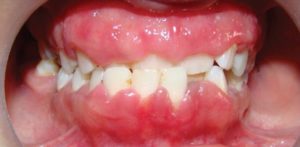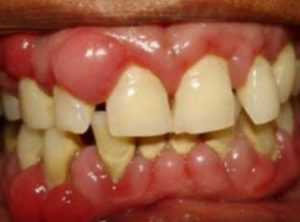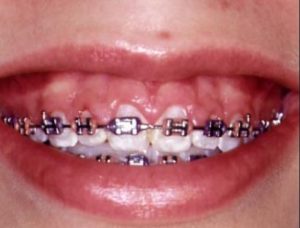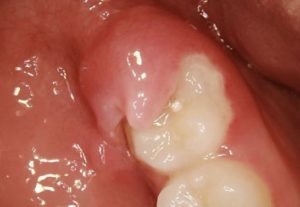Could the pain around wisdom tooth be caused by swollen gums? The condition is common among children and during pregnancy. In this article, we shall cover the causes, symptoms, treatment and home remedies to relieve the pain caused by the swelling.
According to the American Pregnancy association, hormonal changes during pregnancy plays a very vital role in causing the swelling of gums. Hormonal changes makes the gums more vulnerable to plaque. This will lead to inflammation and bleeding of gums and teeth. This is condition is referred to as pregnancy gingivitis or gum disease. That is why it is very important for you to have a good dental care plan when pregnant

Apart from hormonal change s during pregnancy, your gum might also swell due to gum disease and malnutrition. In children, the common cause of swelling is teething syndrome. Commonly referred to as simply teething, is a normal process that infants go through as their teeth break or cut through the gums. Other cause of the swelling are discussed though the article.
Related article:
Swollen Gums Symptoms
Swollen gums is a common condition among those who fail to maintain proper oral hygiene. The condition is mostly caused by the accumulation of plaque in teeth formed by bacterial. The bacteria may causes the gums to become swollen, inflamed and bleed at times. Many people with gingivitis, the inflammation may not be painful.
The following are the common symptoms associated with the swelling of the gums:
- Inflammation and swelling of the gums
- Painful bumps may be seen on gums in some people
- The gums will become bright red or purple
- Tender or painful gums
- Halitosis or bad breath
- The gums may bleed at times
- Sensitive teeth
To some people, bleeding gums are in most cases a sign of gum disease, this may not always be the case, and the bleeding might also point to a possible health problems as well. Bleeding gums can also be as a result of brushing your teeth vigorously or wearing dentures that don’t fit correctly. Some of these symptoms can be severe and cause a lot of pain and discomfort especially for children. That is hy we advise you to seek the attention of a dentist if you develop the symptoms above.
Swollen Gums Causes
Some people may experience periodic swelling of the gums from time to time. For others, the swelling will be a one-time thing. But what are the possible cause of the swelling? The inflammation of the gum is common in both children and adults. The common cause of the swelling is the accumulation of plaque in teeth caused by not maintaining high levels of oral hygiene.

In women, the swelling is believed to be triggered by hormonal changes especially during pregnancy. The swelling is in most cases mild, and can be managed at home. In cases of severe symptoms, immediate medical attention is advised. Below are some other common known cause of the swelling.
1. Gum disease, gingivitis
This is the inflammation of the gum and mucous membrane lining the inside mouth. The condition is caused by poor oral hygiene and bacterial infection from plaque accumulation in teeth and gums.
2. Swollen gums after braces
Braces also known as dental braces, or orthodontic cases are device used to align and straighten teeth. They help position them with regards to a person bites. This is common while working to improve dental health. When not done properly, some people may have swollen gums due to the irritation and damaging of the gum tissues.

Depending on how severe the damage was, the gum will be able to heal on its own within a week or two. Seek immediate medical attention if this is not the case. Also do so if your teeth become sensitive.
3. Canker sores
Canker sores are small ulcers or sore in the mouth or lips. The sores can be caused by injury or trauma in mouth and mucous membrane, acidic or spicy foods, vitamin deficiency, hormonal changes, stress and auto immune responses. The sores will heal on their own thus requires not treatment.
4. STD, herpes
The gums may also be swollen as a result of herpes simplex virus infection. Herpes is the infection of the lips, mouth or gum. It causes small, painful blisters known as cold sores or fever blisters. Herpes can also result in the swelling of the gums and mouth lining.
5. Pregnancy
Hormonal changes is the main caused of swelling during pregnancy. It causes a condition known as pregnancy gingivitis. With this condition, periodic and regular appointment to the dentist are required.
6. Nutritional deficiencies
In children, lack of vitamin C can cause the swelling and bleeding of gums. To remedy this, you can give your kid folic acid-a soluble form of vitamin and make sure you feed them on a balanced diet.
7. Tooth decay
Tooth decay caused by bacterial action can also cause swelling of the gums. Seek medical advice on the best way to handle tooth decay from your dentist.
8. Herpes stomatitis
Herpes stomatitis is a viral infection of the mouth that cause mouth sores and ulcer. The infection can also cause the inflammation and swelling of the gums.
9. Teething syndrome in children
Teething is a normal process that infant go through as their teeth breaks through the gums. This can cause swelling of the gums but it will heal on its own once the teeth breaks through.
Swollen Gums in Child, Babies or Toddlers
The oral health of your child should be a priority, it is important to always look inside the mouth of you kid to watch out for symptoms of oral problems such as cancer sore, oral thrush or mouth ulcers. Always make sure your kid brushes the mouth regularly after meals to avoid accumulation of plaque and tooth decay. Regular appointments to the dentist is also an important measure of ensuring your kids’ mouth is healthy.
In children or toddlers, the common infection or complication of the mouth will include the following;
Oral thrush: this is a common mouth condition among young children. It is a fungal infection that affects the soft tissues inside the mouth. It appears as white milky patches that can be wiped out easily. A more general infection will have symptoms like fever and gastrointestinal irritation. To treat the infection, topical antifungal is applied directly on the affected area.
Mouth ulcer: this are sores inside mouth that can be caused by a variety of causes. In children, traumatic ulcers are the common type of mouth ulcers. In healthy children, the ulcers will heal on their own within a week or two. If this is not the cases, you need to seek immediate medical attention. To manage the pain at home, make sure the kid is drinking plenty of water, avoid acidic foods and drinks and always ensure your child uses a protective gel especially before eating.
Oral herpes: also known as cold sores can again cause the swelling and inflammation of the gums in children. The infection is caused by a virus, herpes simplex virus transmitted form contact with people with cold sores. The virus can also be spread through saliva of an infected person. In children, a considerable number of those infected with the virus will have recurring episodes.
Some people will also not show the symptoms of cold sore. There is no cure for the infection, however, to manage the symptoms at home, you need to make sure your child drinks a lot of fluid preferable water, bland foods such as plain natural yoghurt and avoids salty or acidic foods.
Tooth abscess: are pimple like bumps formed by an infection around the root of the teeth. The condition is normally associated with tooth decay and appears as a pimple on gum or a swelling on the face of the affected tooth. Boils on gums can be very painful, you need to seek immediate medical attention if you notice this swelling on the gums of your child.
Cellulitis: is a bacterial infection that appears a redness of the mucous membrane of the mouth and face. The condition will cause fever and swelling and has the ability to spread very fast. On face, cellulitis is common among children below the age of three. To prevent the spread to other parts, you need to seek immediate medical attention.
Eruption cyst: a smooth, bluish, dome shaped blister that appears on the gum where a tooth is coming through. When the tooth bursts through, the cyst will bust and heal on its own, as such, no treatment Is required.
Hand, foot and mouth disease in children can also cause the swelling of gums. The condition is characterized by painful ulcer on mouth and small painful blisters on hands and foots. No medication is required, the disease will heal on its own. To reduce discomfort, we advise you give your child soft drinks and plenty of water. The condition is contagious, you need to reduce the contact between your child and his or her mates to prevent spreading.
To ensure your child health is maintain, you need to look out for the following symptoms and arrange periodic appointments to the dentist. Fever, general feeling of tiredness, lack of appetite, inflamed gums, sore throats, swollen neck glands
Swollen Gums around Wisdom Tooth
Swollen gums around wisdom teeth is caused by an infection around or near the tooth. This infection is referred to as pericoronitis literally translated to around crown inflammation. According to a research by the Columbia University Collage of Dental Medicine, the condition occurs when the molars start to erupt creating a flap that accumulates food debris turning into a hotbed of bacteria.

The accumulation and growth of bacteria will cause the inflammation of the gums. According to the research, the condition can also occur around a wisdom tooth that is still completely under the gums. The condition will have the following symptoms:
- painful swollen gum around the affected tooth
- the gum near the infected tooth may discharge pus or blood
- bad smell or test in the mouth
- the lymph nodes under the chin may be swollen
- muscles spasms in the jaws
- thee affected side of the mouth may become swollen
Mild cases of pericoronitis can be managed at home with antibiotics and salty water rinse. The symptoms will be able to go away within a week or two. It is common for the condition to recur especially where the tooth does not enter the mouth completely or food and bacteria keep building up under the gum.
To help prevent swollen gums around wisdom tooth, brush any erupting wisdom tooth and floss around it. By doing this, you help prevent the accumulation and buildup of bacterial under the gums. In events that this process fails to work, and pericoronitis returns, you will need to have the flap of the gum tissue removed. If the flap grows back, you may need to extract the wisdom tooth.
Swollen Gums Pregnancy
Also known as pregnancy gingivitis, this condition is caused by hormonal changes that occur to women during pregnancy. It causes swollen gums which are usually sores and susceptible to bleeding. The condition also result in the inflammation and swelling of the gums. The hormonal changes cause increase in blood flow to the gums causing them to become more sensitive, irritable and swollen.
With hormonal changes, the body normal response to bacteria is hindered, this means, the bacteria are more likely to cause periodontal infection. He condition will also make it more likely for plaque to build up on gums making you more susceptible to gingivitis.
The swelling or the gingivitis will be mild in the first trimester. The severity usually increases in the second trimester. To prevent this condition, pregnant women need to maintain good oral care. For a pregnant woman, you need to brush your teeth at least twice a day and floss at least once. Use a soft brush to cause minimal irritation of the gums and mouth lining.
You need to seek medical attention from a professional dentist. If gingivitis or the swelling of the gums is left unchecked, it may lead to a more serious form of gum disease known as periodontitis. Periodontitis is defined as the inflammation of the tissues around the teeth that causes the shrinking of the gums and loosening of teeth.
Maintain a good oral hygiene and routine professional cleaning to prevent this complications and many other oral diseases and infection.
Swollen Gums with White Spots, Pus
Tooth abscess sometimes referred to as dental abscess is the accumulation of pus that forms inside the teeth or gums. The abscess typically originates from bacterial infection that often accumulates in the soft pulp of the tooth.
Dental abscess is the main cause of swelling gums with white spots or bumps filled with pus. Mild cases can be managed with antibiotics, for severe cases, your dentist may prescribe a root canal treatment to completely remove the abscess or drain the pus out.
Swollen Gums in Back of Mouth
Are your gums swollen in the back of mouth? This can be common in pregnant women due to hormonal changes. Apart from this, the swelling can also be caused by pericoronitis, this is the inflammation of the soft tissues surrounding the crown of an erupted tooth or at the back of the mouth including the gums and dental follicle.
Those with this condition will have the following symptoms:
- painful gums
- swollen gum tissues
- bad taste and breath
- swollen lymph nodes at the back neck
The symptoms can be severe and cause a lot of discomfort, you need to seek immediate medical attention to prevent that from happening.
Swollen Gums Sore Throat
Swelling of gums and sore thought is common in children compared to adults. This condition is caused by gingivostomatitis also referred to as primary gingivostomatitis or orolabial herpes. The condition is a combination of gingivitis and stomatitis. The condition cause the inflammation of the oral mucosa membrane and the gums.
Tender sore is the primary symptoms of this infection but you may also experience bad breath, fever, drooling or malaise. The condition is a common infection of the mouth and gums. Those infected with the condition will experience swelling of gums and lesion in mouth that resemble those caused by canker sores.
Swollen Gums Tooth Pain
The inflammation and swelling of the gums caused by condition such as tooth abscess, gingivitis, periodontitis and stomatitis might result in pain of not only the gums but also the tooth. Most people will report cases of tooth pain as a result of the swelling of the gums.
Unless the swelling of the gums is caused by the underlying problems with the tooth for example tooth decay, then the pain and other symptoms will clear within a few days. Seek medical attention if the pain persist of you develop other symptoms such as sensitivity, bleeding or the teeth becomes weak.
Swollen Gums Roof of Mouth
Stomatitis is the common cause of swelling on the gums roof of mouth. Stomatitis is an inflammation of the mucous membrane that lines the mouth, the cheeks, gums, tongue, lips, palate (roof of mouth) and the floor of mouth.
Stomatitis is not contagious, it is caused by problems with oral hygiene or damage to the membrane lining the inside of mouth. Other causes include dry tissues from breathing through the mouth as a result of clogged nasal passage.
Depending with the type of inflammation, stomatitis treatment will include use of topical corticosteroids, immunomodulatory agents, antimicrobials and anesthetics such as topical lidocaine
Swollen Gums No Pain
It is very common for some people to have their gums swollen with pain. Depending on what is causing the inflammation or swelling, the swelling might clear up on its own within a few days or weeks. Tooth abscess, pericoronitis, oral gingivitis and periodontitis are some of the common oral infection that might cause the swelling.
Mild cases of the swelling can be managed with over-the-counter antibiotics. For severe cases of the swelling or in cases where the symptoms and swelling persist for more than a week, you need to have a professional health care provider preferable a dentist look at the swelling to establish what the underlying cause is.
You need to maintain high levels of oral hygiene by brushing your teeth regularly after meals using soft toothbrush to prevent irritation of the gums and mucous membrane that line the inside of mouth. You need to also be on the watch for the following symptoms:
- persistent mouth sores
- lumps or thickening in the cheek
- numbness of the tongue
- pain n teeth or jaw
- unexplained bad breath
Swollen Gums Treatment, Medicine, Cure
The best way to prevent and treat gum disease is practicing good oral hygiene. This encompasses such things as brushing the teeth for a round two minutes, using toothpaste that contains the right amount of fluoride, flossing the teeth regularly, avoiding smoking and scheduling regular appointments with the dentist. Apart from doing this, other treatment will include the following:
Using antiseptic mouth wash to get rid of plaque that buildup along teeth and gum providing a good breeding ground for bacteria that causes mouth and gums diseases. Your dentist will help you identify the right mouth wash that contains the right combination of the compounds required.
The dentist may also prescribe “professional cleaning” where scale and polish is used to remove plaque and tartar (hard plaque) form gums and teeth. This process will be performed by a dental hygienist.
Depending on how severe the gum disease is, root planning may also be used. This is deep cleaning under the gums to get rid of bacteria under the root of the teeth. Before the procedure is performed, the dentist will have to put you under a local anesthetic medication.
Severe cases of gum or teeth disease can also be treated by periodontal surgery. Antibiotics can also be used to treat infection during root planning or gum surgery.
Swollen Gums around Tooth Home Remedy
To manage swollen gums and have heathier oral hygiene you can do the following:
- have regular periodic dental cheek ups especially during pregnancy
- a salty water rinse after meals can also help keep your gums and tooth free of bacterial accumulation
- you need to always brush your teeth after meals, for pregnant women, it is advised you brush them twice per day especially after vomiting from morning sickness, this is a recommendation from the American Pregnancy Organization.
- The other thing you can do to prevent oral problems is maintain good nutrition. Eat food that strengthen the teeth and the gums.
- Warm and cold compress of the gums can also provide quick relief for sores, swollen gums as they help reduce pain, inflammation and swelling.
- To help fight germs and bacterial infection, you can use hydrogen peroxide. This will also help reduce the swelling and inflammation
- Turmeric contains antioxidants and anti-inflammatory agents that can be helpful in managing pain, swelling and inflammation.
- For swollen and bleeding gums, you can apply aloe Vera gel. The gel can also be helpful in preventing bacterial infection in the gums
Sources and references
- https://www.betterhealth.vic.gov.au/health/conditionsandtreatments/oral-conditions-young-children
- http://www.healthline.com/health/gingivostomatitis
- http://www.colgate.com/en/us/oc/oral-health/conditions/gum-disease/article/gum-disease-treatment-for-kids-0414
- http://www.colgate.com/en/us/oc/oral-health/conditions/wisdom-teeth/article/perocoronitis-infection-near-wisdom-tooth
- http://americanpregnancy.org/pregnancy-health/swollen-gums-during-pregnancy/
- http://www.nhs.uk/Conditions/Gum-disease/Pages/Treatment.aspx
